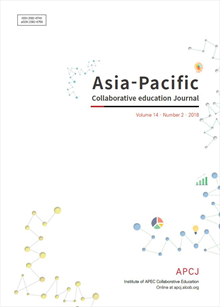간행물
Asia-Pacific Collaborative education Journal

- 발행기관 APEC국제교육협력원
- 자료유형 학술지
- 간기 반년간
- ISSN 2092-674X (Print)2092-6758 (Online)
- 수록기간 2004 ~ 2021
- 주제분류 사회과학 > 교육학 사회과학 분류의 다른 간행물
- 십진분류KDC 371DDC 379
권호리스트/논문검색
Volume 14 Number 1 (2018년 6월) 3건
1.
2018.06
구독 인증기관 무료, 개인회원 유료
This research study explored the implementation of School Learning Improvement Plans (SLIP) in one of the highlands districts of Papua New Guinea. A SLIP provides an implementation framework for promoting excellence in students learning and school performance. The rationale for the study was to identify strengths and weaknesses from the viewpoints of people involved in SLIP at the school level. Using mixed methods, data were obtained from selected primary school head teachers, senior teachers and assistant teachers. The study found that SLIPs were a highly effective strategy to get collaboration among stakeholders to plan for school improvement. Benefits to schools were seen to be provision of teaching and learning materials, focus on improved student learning, professional development for staff, infrastructure maintenance, good parent and community support and financial reporting. Responses varied in regard to the extent to which strategies were effective. Effective leadership was seen to be the key to success.
4,500원
2.
2018.06
구독 인증기관 무료, 개인회원 유료
This article introduces Russia's international development assistance to global education, specifically the Russia Education Aid for Development (READ) programme. This study utilises analysis of literature and reports based on the READ programme’s background, structure, stakeholders and procedure. The objective of this research is to illustrate READ's key characteristics that helped it to succeed and lessons they have learned. Results show that READ is a well-planned, triangular cooperation programme requiring further study due to its applicability to other emerging donors. Moreover, this study sees a need for more research in education development assistance of not only Russia, but also other emerging donors.
4,000원

